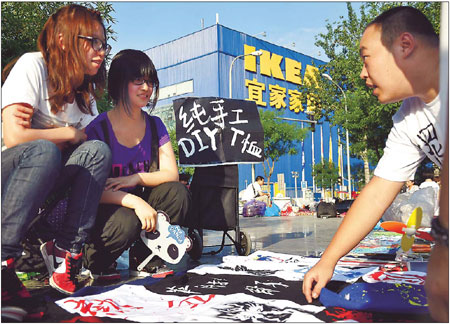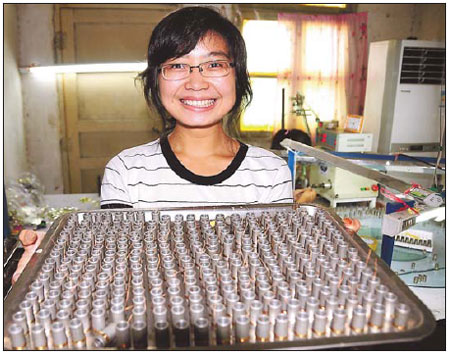Time to let off steam
 |
|
High school graduates Chen Yuwei and Li Yaqian (middle) sell their hand-painted T-shirts at a flea market in Beijing. Liu Xiangrui / China Daily |
"Cool hand painted T-shirts! No color fading and order your favorite patterns!" calls out Li Yaqian, 17, who runs a stall at a flea market in north Beijing with her best friend Chen Yuwei. As millions of high school graduates get a well-deserved break after their gaokao, or college entrance examinations in early June, they have come up with diverse ideas to spice up the three-month-long holiday before entering university.
Some have taken on part-time jobs to make money and get some experience of the "real world".
After Li, a graduate of Beijing No 17 Middle School, came across the Beijing flea market she decided to sell notebooks and ornaments she didn't need anymore at rock bottom prices.
She also decided to use her design skills (she has applied to study design at Beijing University of Technology) and create T-shirts, along with her business partner Chen.
They bought some T-shirts at a wholesale market and painted designs on them. They sell their merchandize at the flea market two or three times a week, from 4 pm to 10 pm, when their parents pick them up.
"It's real-life experience. We enjoy this so much," Li says.
"Schooling has been her life over the years and she'd never tried anything like this before," says Li's mother, Yan Xiulan. "Of course I don't expect her to make much money, but it's good preparation for life."
Li has sold nearly all the 70 T-shirts she purchased, for a profit of 3,000 yuan ($464). She has even roped in former classmates to help promote her business.
Li adds that her experience has inspired other former classmates to also take on part-time jobs over the holiday period.
Soon after his exams, 20-year-old Chen Jinlong from Quanzhou, Fujian province, found his part-time job in room service at a five-star hotel in the neighboring city of Xiamen on a job-hunting website.
Chen deliberately looked for a job at a major hotel in the belief he could improve his English by talking to foreign guests.
"The real situation is quite different, because there aren't so many foreigners," he says. However, he is not disappointed because of the experience he has gained.
"I've made some good friends here, had a lot of fun, and learned some lessons," says Chen, who adds that he pays more attention to detail because of his work.
"What's more, I understand that making money is not that easy and communicating is not that difficult when you take the initiative to talk to others."
He has also learned to be financially independent.
 |
|
High school graduate Chen Na interns at an electrical components factory in Henan province during the summer holidays, in preparation for college. Yang Yinpeng / For China Daily |
"I messaged all my family members on June 27 saying I'll never ask a penny from them, even for my university tuition."
He turned down his father's suggestion to travel, saying he didn't want to spend family money.
Eager to start his own business in the future, he plans to learn search engine optimization skills to improve the Internet tea business he is working on in his spare time.
To prepare for overseas study in the future, a growing number of high school graduates have made overseas trips to check out universities.
Liu Wei, principal of the Changsha Branch School of New Channel International Education Group, in Hunan province, says high school graduates make up 10 to 20 percent of the 800 students annually that take trips organized by the group.
"Countries favored for overseas studies are always the most popular," Liu says, adding the tours help students understand the culture of foreign countries as they board with local families.
"I've never lived abroad and will try to fit in with the environment, culture and food there," says 17-year-old Lin Zhiyuan, from Changsha, who has decided to visit some US universities with New Channel's campus tours and plans to study there when he is "fully ready".
"As a Chinese saying goes, 'Traveling 10,000 miles is more helpful than reading 10,000 books to gain knowledge.' We want him to have some sense of universities and studying abroad with this," Lin's mother Chen Wen says.
The two-week-long trip costs 30,000 yuan ($4,643), and although Lin would prefer to go with his parents, her mother disagrees.
"I'd even encourage him to travel abroad by himself if possible," she says.
Besides traveling, learning skills like driving and cooking rank high on the list of plans for recent high school graduates.
"You can't have too many skills," says 18-year-old Gao Chenxiang from Beijing, who is learning to draw cartoons and play the ocarina. He also plans to do English lessons and he's learning to cook from his mother.
Fas
cinated by Beijing's culture and history, he often cycles around the city's hutong and scenic spots with his classmates, and is planning a trip to Sichuan and Yunnan provinces with his parents.
He says his studies have limited the amount of time he spends with them and "I can make up for it now".
Other students want fun after the pressure of exams is over, says Han Fang, Gao's English teacher.
"It's OK for them to relax to some extent, but they need to make plans for their holiday, too," she says. She encourages them to do activities such as volunteer work.
"The college entrance exam has long been seen as an all-or-nothing, one-shot affair. As a result, many high school graduates lack motivation when they go to university," warns Liu Xiaoting, a professor at Beijing Normal University.
"They want to regain the happiness of childhood which they've sacrificed by studying. But they go too far and find it difficult to adjust to college life."
Liu says parents should not leave children to their own devices after the national exams, but should instead help them prepare for university.
Summer camps, he says, are a good idea, as they can be inspiring and are a good opportunity to make new friends.
"These three months, if well planned, can be a meaningful period," Liu says.
Lin Qi contributed to this story.
















